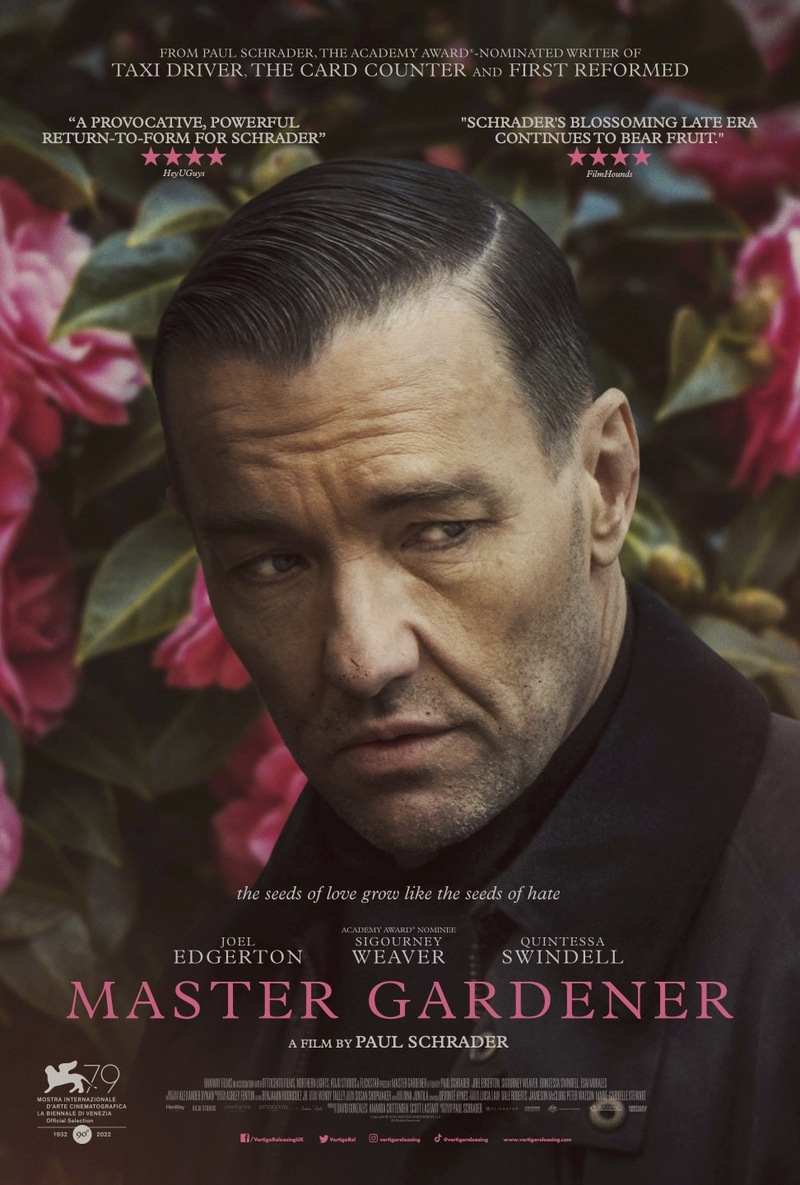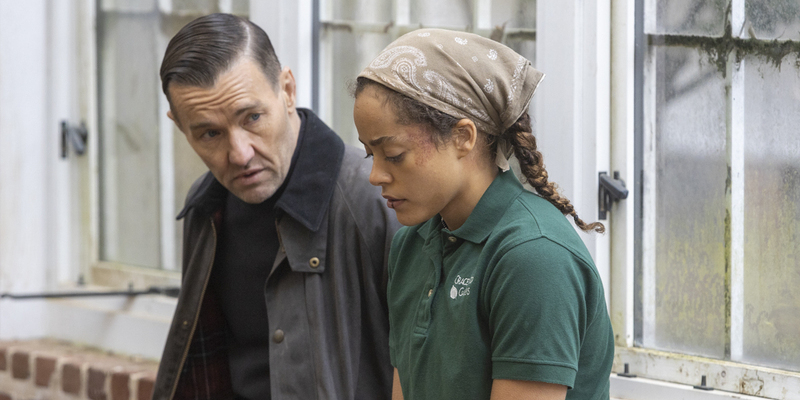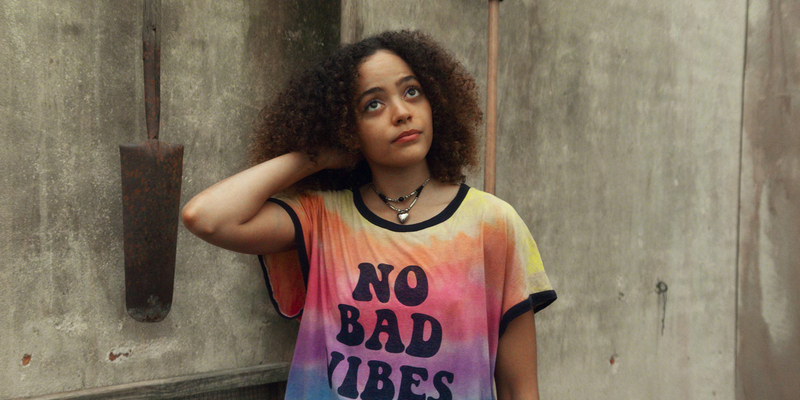
Review by
Eric Hillis
Directed by: Paul Schrader
Starring: Joel Edgerton, Quintessa Swindell, Sigourney
Weaver, Esai Morales

The late
Larry Cohen
began his screenwriting career by submitting scripts for popular
American TV shows of the 1960s (TV's real Golden Age, if you ask me).
Some were accepted but most were rejected. Later, when he established
himself as a feature film writer and director, Cohen would rework some
of his rejected TV scripts into original movies. If I wasn't familiar
with Paul Schrader's origins I might suspect that his latest
movie, Master Gardener, began life as a rejected script for that outstanding '60s show
The Fugitive. The resemblances between the structure of Schrader's film and the
average episode of that show are uncanny. In fact,
Master Gardener is a far more faithful big screen
adaptation of The Fugitive than the one we actually got
back in 1993, and its leading man, Joel Edgerton, is a far better
Richard Kimble than Harrison Ford.
In The Fugitive, Kimble was a doctor who found himself on the run from the law after
being wrongly accused of his wife's murder. His long term goal was to
prove his innocence by finding the one-armed man he saw fleeing the
crime scene, but this quest only really popped up two or three times a
season. The average episode of The Fugitive saw Kimble
adopting an alias and taking a menial job while keeping his head down.
He'd often find himself compromised, usually by a woman who falls in
love with him.

That's the basic setup Schrader has adopted for his latest. The Kimble
surrogate here is Edgerton's protagonist, a former Neo-Nazi hitman who
now lives under the name of Narvel Roth and works as the head gardener
at Gracewood, a Louisiana plantation now open to the public. Like
Kimble, he keeps his head down and just wants to get on with life and
his job, which seems to have brought him contentment. His torso and back
are covered with white supremacist tattoos, which he claims he once
considered having removed but changed his mind. We're never given a
reason why Narvel keeps his tattoos, but it's easy to suspect it's his
way of ensuring he never allows himself to get close to anyone.
His boss, the lady of the house, Mrs Haverhill (Sigourney Weaver), is well aware of Narvel's tattoos and his past, having agreed to
give him a chance at rebuilding his life when he was given a new
identity by the FBI, with whom he colluded to put away some heavy
hitters in the Nazi movement. Once a week, Narvel dons a suit and visits
the big house for dinner with his employer, before they retire to her
bed. These scenes recall one of Schrader's best films,
American Gigolo, with Narvel clearly going through a routine, but doing so in a manner
that's well rehearsed enough to be convincing. Far from repulsed by his
tattoos, Haverhill seems to find them appealing, as though she's
inhabited by the racist spirit of her plantation-owning ancestors.

Narvel's routine is disrupted when Haverhill assigns him the task of
taking on her troubled biracial great-niece Maya (Quintessa Swindell) as an apprentice and student. Both her parents having died, Maya has
turned to drugs and is in need of positive distraction. Surprisingly,
she takes to gardening and is an eager student. She also falls head over
heels for Narvel, who comes close to accepting her offers of physical
affection, only to remember he's covered in the sort of tattoos that
aren't going to do him any favours with a young black woman. Unable to
consummate his feelings for Maya physically, Narvel decides to help her
by threatening the drug dealers who have their claws in her, and who
regularly subject her to beatings. This sees Narvel drawn back to the
violent life he had sworn to leave.
Schrader is often mocked by his detractors for his obsession with a
certain type of male protagonist, "God's lonely man." Like so many of
his protagonists, Narvel keeps his thoughts in a journal and lives in a
sparsely decorated room. And like so many of Schrader's male
protagonists, Narvel is a socially awkward square who finds himself
paired with a vivacious young woman. But Schrader's repetition of key
tropes allows us to chart the subtleties of his career progression, and
while they adhere to the same basic principles, the average Schrader
protagonist of recent years is a very different man to those he wrote in
his younger days. The Schrader protagonists of the past gave in to their
anger – witness the violence of Travis Bickle, Jake Van Dorn and Charles
Rane – whereas those of his later years have turned towards love rather
than hate. These are the films of an old man who has realised the world
may not be spinning in the direction he'd like, but there's no point in
getting angry. Better to make the most of it while you can, and find
beauty and contentment where you can.

The interracial and age-gap relationship at the centre of
Master Gardener feels like a deliberate provocation on
Schrader's part. Coming from a generation that fought hard for such
things to be accepted, he's likely bewildered by how younger generations
are so obsessed with pouring scorn on such couplings. Watching
Master Gardener, I began thinking about how American TV's famous first interracial
kiss between Kirk and Uhura on
Star Trek
was applauded by liberals and derided by conservatives at the time.
Today, liberals would likely ally with conservatives in finding it
offensive and call it an abuse of "power dynamics."
Master Gardener plays like Schrader calling out those sad
little people who live on the internet and pour scorn on anyone who gets
on with life, who spend their lives peeking through digital curtains and
wielding words like "inappropriate" and "problematic," who turn being
perpetually offended (usually on behalf of others) into a lifestyle.
They're usually white and middle class, the sort of people who could
never understand the concept of finding joy where you can because their
idea of contentment has always been handed to them on a silver platter.
Such people would seem to be represented by Weaver's Mrs Haverhill, who
never seems to leave her home and is quick to point out others' flaws
while ignoring any criticism pointed in her direction. There's a
wonderful interaction between Narvel and his boss when he confesses his
relationship with May. "That's obscene," she growls. "No it's not," he
replies defensively, "I've seen obscene." If you think two damaged
people finding comfort in one another is obscene, this probably isn't
the movie for you. If you want to see a master filmmaker making peace
with the world as he prepares to leave it,
Master Gardener should be top of your watch list.

